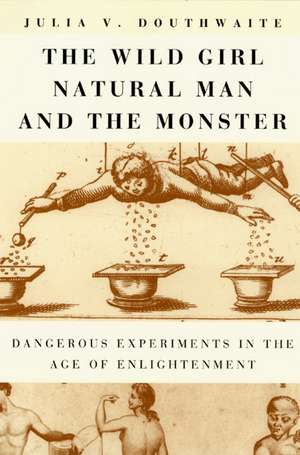The Wild Girl, Natural Man, and the Monster: Dangerous Experiments in the Age of Enlightenment
Autor Julia V. Douthwaiteen Limba Engleză Paperback – 15 iun 2002
This study looks at the lives of the most famous "wild children" of eighteenth-century Europe, showing how they open a window onto European ideas about the potential and perfectibility of mankind. Julia V. Douthwaite recounts reports of feral children such as the wild girl of Champagne (captured in 1731 and baptized as Marie-Angélique Leblanc), offering a fascinating glimpse into beliefs about the difference between man and beast and the means once used to civilize the uncivilized.
A variety of educational experiments failed to tame these feral children by the standards of the day. After telling their stories, Douthwaite turns to literature that reflects on similar experiments to perfect human subjects. Her examples range from utopian schemes for progressive childrearing to philosophical tales of animated statues, from revolutionary theories of regenerated men to Gothic tales of scientists run amok. Encompassing thinkers such as Rousseau, Sade, Defoe, and Mary Shelley, Douthwaite shows how the Enlightenment conceived of mankind as an infinitely malleable entity, first with optimism, then with apprehension. Exposing the darker side of eighteenth-century thought, she demonstrates how advances in science gave rise to troubling ethical concerns, as parents, scientists, and politicians tried to perfect mankind with disastrous results.
A variety of educational experiments failed to tame these feral children by the standards of the day. After telling their stories, Douthwaite turns to literature that reflects on similar experiments to perfect human subjects. Her examples range from utopian schemes for progressive childrearing to philosophical tales of animated statues, from revolutionary theories of regenerated men to Gothic tales of scientists run amok. Encompassing thinkers such as Rousseau, Sade, Defoe, and Mary Shelley, Douthwaite shows how the Enlightenment conceived of mankind as an infinitely malleable entity, first with optimism, then with apprehension. Exposing the darker side of eighteenth-century thought, she demonstrates how advances in science gave rise to troubling ethical concerns, as parents, scientists, and politicians tried to perfect mankind with disastrous results.
Preț: 277.53 lei
Nou
Puncte Express: 416
Preț estimativ în valută:
53.11€ • 57.92$ • 44.78£
53.11€ • 57.92$ • 44.78£
Carte tipărită la comandă
Livrare economică 24 aprilie-08 mai
Preluare comenzi: 021 569.72.76
Specificații
ISBN-13: 9780226160566
ISBN-10: 0226160564
Pagini: 322
Ilustrații: 24 halftones
Dimensiuni: 152 x 229 x 28 mm
Greutate: 0.45 kg
Ediția:1
Editura: University of Chicago Press
Colecția University of Chicago Press
ISBN-10: 0226160564
Pagini: 322
Ilustrații: 24 halftones
Dimensiuni: 152 x 229 x 28 mm
Greutate: 0.45 kg
Ediția:1
Editura: University of Chicago Press
Colecția University of Chicago Press
Notă biografică
Julia V. Douthwaite teaches French and comparative literature at the University of Notre Dame. She is the author of Exotic Women: Literary Heroines and Cultural Strategies in Ancien Régime France.
Cuprins
List of Illustrations
Acknowledgments
Introduction
1. Wild Children: Establishing the Boundaries of Nature and Science
2. The Animated Statue and the Plasticity of Mankind
3. Compromised Idylls: Natural Man and Woman Encultured
4. Raising the Rational Child: Real-Life Experiments and Alternatives to Rousseau
5. Perfectibility in the Revolutionary Era: Utopian Politics and Dystopian Fictions
Epilogue: Monstrous Imperfection
Notes
Index
Acknowledgments
Introduction
1. Wild Children: Establishing the Boundaries of Nature and Science
2. The Animated Statue and the Plasticity of Mankind
3. Compromised Idylls: Natural Man and Woman Encultured
4. Raising the Rational Child: Real-Life Experiments and Alternatives to Rousseau
5. Perfectibility in the Revolutionary Era: Utopian Politics and Dystopian Fictions
Epilogue: Monstrous Imperfection
Notes
Index
